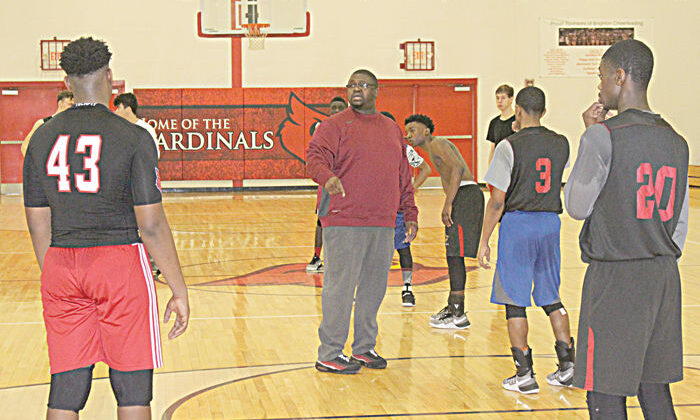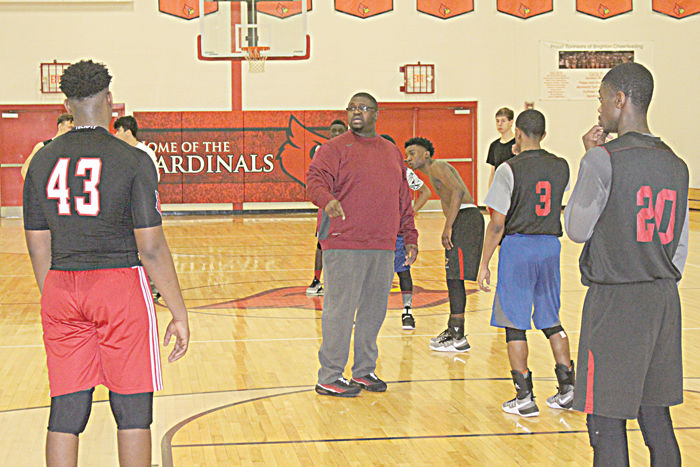

Stan Gatlin was 20 in 1996. He had just earned his associate’s degree from Mary Holmes College in West Point, Miss., was the valedictorian of his class and was preparing to move on to Jackson State University, where we would eventually earn his bachelor’s and two advanced degrees.
He decided to apply for a job at veterinarian office in Jackson, Miss. because he was interested in a career in the medical field. Gatlin was a USA Today All-American scholar and had a resume in hand that detailed his extensive community service.
When the white employer saw a young black man walk into his office, his first question for Gatlin was this: “Do you sell drugs?”
“That startled me,” says Gatlin, now 41 and a teacher and basketball coach at Brighton High School. “I make straight As. When would I have time to sell drugs? I was wearing a shirt and tie, professional looking. I didn’t think I looked like a drug dealer.”
He was understandably upset, and surprised. He didn’t tell his mother about it until a year ago.
“It kind of hurt my feelings, but at the same time it enraged me to get more knowledge. You wouldn’t expect to have to go through that, especially when you’ve done everything you’re supposed to do. No record, never been to jail, never done any drugs. Here you are, excellent student, a leader in the community, and somebody asks you a crazy question like that.”
There’s no reason to explain why the man asked the question. It’s so obvious, Gatlin doesn’t bother explaining it now either, 21 years later as he sits in the Brighton High School gym next to his 17-year-old son, Taelyr, who is the leading scorer on the Brighton basketball team.
Like everybody, Gatlin’s past experiences have shaped who he is today. He grew up in McComb, Miss., a small town located near the Louisiana state line. In the 1960s, the town made headlines when Klu Klux Klan members tried to stop African-Americans from registering to vote. There were also church bombings around 1964, the year the Civil Rights Act was passed, in the area linked to the KKK.
Gatlin wasn’t born yet, but his parents and grandparents went through it all. His grandmother, Hancie McCray, who is 93 now, was and is a big influence on Gatlin, who is not shy about expressing his opinions on Facebook about today’s social and political issues.
Anybody who is a Facebook friend of Gatlin is certainly aware of his views. He’s gone in on President Donald Trump on several occasions and has posted about the rocky relationship between some police departments and black men. A recent post of his connected the Blacks Live Matter and All Lives Matter movements and the so-called Muslim Travel Ban.
“She’s very outspoken about life in general,” Gatlin says of his grandmother. “I get that courage to say what I feel or believe from her.”
Gatlin will acknowledge that race relations have improved since the 1960s, but issues still come up. He said two of his sons, Taelyr and Stanley Jr., who is a 19-year-old student at Vanderbilt, have been told by white girls they couldn’t date them because of their parents’ objections. Both girls live in Tipton County, he says.
“He (Taelyr) said he wasn’t bothered by it, but just took it as an experience,” Gatlin says. “Having to explain that to a kid is hurtful, but you have to do it so that they don’t go hating people that had nothing to do with it.”
Taelyr says one of his white friends recently asked why Black History Month exists. He said the conversation was cordial and that the student seemed to genuinely not understand what it’s about.
“She didn’t understand what black people went through,” Taelyr says. “We’ve come a long way to get to where we are right now, which is a whole lot better than it was back then. It’s still not gone … From what I’ve seen, and what I’ve heard from back then, there’s been some progress.”
While the elder Gatlin refuses to be quiet about the country’s problems, he does not want to come off as an angry black man who thinks all white people are racist. A white member of his basketball booster club recently asked him to dinner to, in Gatlin’s words, “understand what it’s like to be a black man in America.” He thought the meeting was instructive for both of them.
“If you want to sweep everything under the rug or close your eyes about it, it’s not going to go away. These things are still going to be there when you open your eyes. You might as well face it and deal with it.”
With this being Black History Month, the subject comes up in the classroom. Gatlin tries to make sure his students know that it wasn’t just African-Americans who took part in the Civil Rights movement of the 1960s.
“It wasn’t just black people by themselves out there working trying to get their rights. If you look at some of of the pictures and clips, you’ll see that there were blacks, whites and people of other nationalities helping us get where we are right now,” Gatlin says. “I teach my kids it doesn’t matter where somebody comes from. If they’re good people, that’s great. You can be friends with anybody you want to be friends with.”
Gatlin still thinks about the man at the veterinarian office that thought he was a drug dealer because he was black. But, like his son when he encounters racist views, he doesn’t let it define who he is.
“I could have used that as an excuse to treat people bad, but that’s not my nature. Thank God I have Christ in my life and I know that’s not everybody’s point of view … It’s not about having a pity party about it or being mad at somebody about it. We have to work together. That’s how we’re going to survive this thing … This is the greatest country. We just have to get rid of those mindsets. There are some good people around here. With everybody working together it will be better for our children.”






Leave a Reply